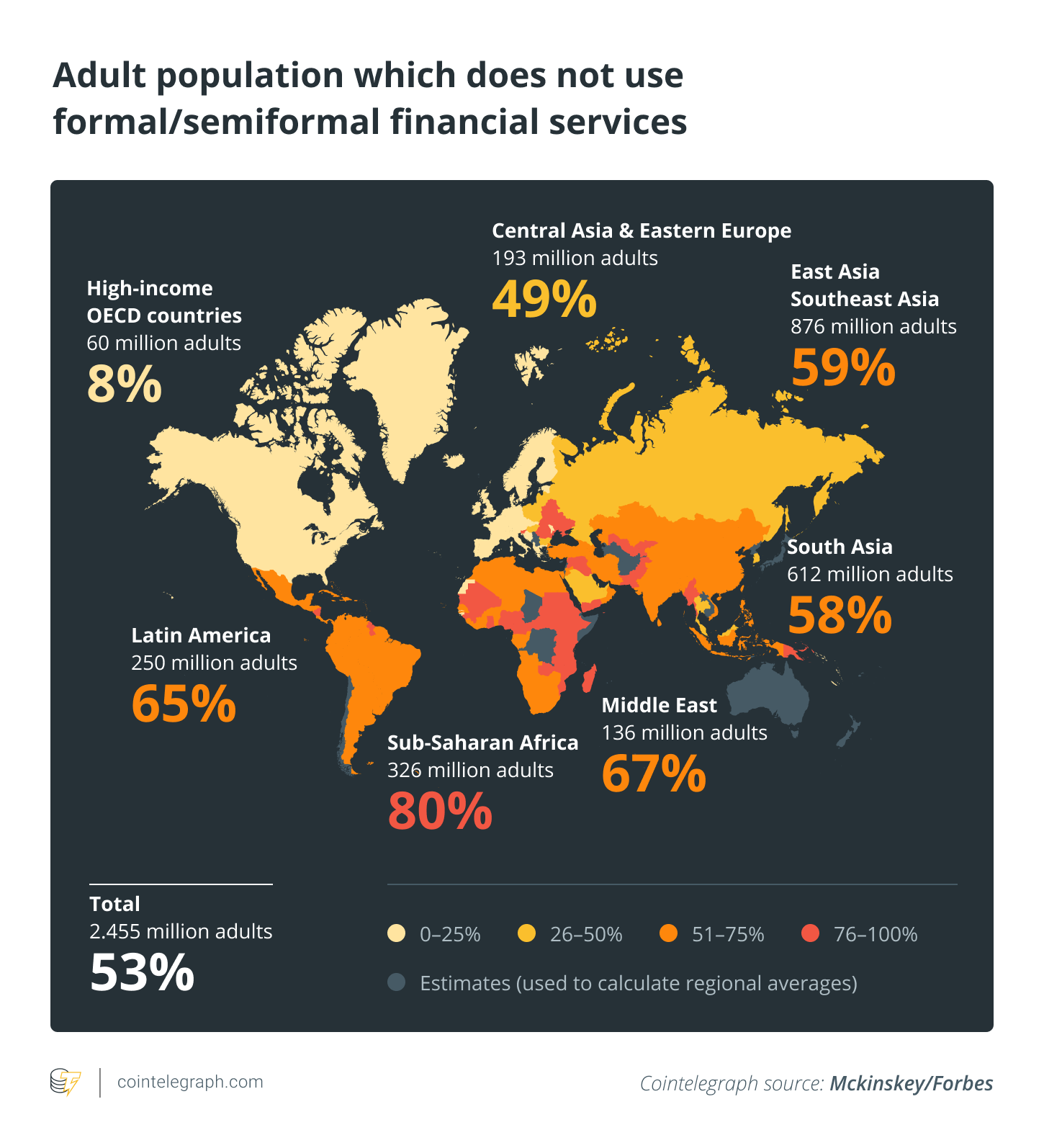Blockchain usage is exploding around the world. But despite the technology’s many vocal advocates, the spread of technology is never even. Adoption is limited by a number of factors, including infrastructure development, local resources and regulation.
As happens with the spread of any emerging technology, certain regions are pulling ahead of the pack. Rado Dragov, the blockchain lead for the International Data Corporation, explained that there are a number of factors that can create favorable conditions for adoption, varying from investment to talent, adding:
“Beyond these factors, blockchain investment is very much influenced by current and upcoming regulation, and the overall government attitude towards this technology. In some cases, regulation is missing and that uncertainty can spook a lot of investors. By adopting business-friendly regulation, some European countries like Switzerland, Estonia and Malta have become fertile ground for many blockchain start-ups.”
Dragov added that, while blockchain investment is growing steadily, it still lags behind other technological investment in the information and communications technology sector:
“IDC forecasted blockchain spending to be $2.7 billion in 2019 — an increase of 80% over 2018. While the current growth rate is quite impressive, it still represents a small portion of total ICT spending. As a comparison, IDC projected ICT investment in new technologies (IoT, AI, AR/VR, etc.) to have reached $961 billion in 2019.”
Middle East
The Middle East is a burgeoning tech hub. Many countries, especially smaller oil-producing states, have their own free economic zones dedicated to furthering technological development and innovation. The United Arab Emirates alone has 45 and both Saudi Arabia and Oman are quickly developing their own. Miami Devcon’s Saba Kifle told CryptoX that Middle East and African governments are putting these economic zones to good use by incubating blockchain projects:
“Ultimately, governmental bodies in each of these regions have heavily invested in understanding how blockchain and digital currencies can improve the economic outlook for their regions. More importantly, they have taken intelligently cautious steps to stand up regulatory sandboxes to test how these technologies will affect that population.”
Development in the Middle East and Africa is set to increase. A February report from the IDC forecast that governments across the region will witness a 400% surge in blockchain-based investment over the next four years.
The report found that MEA countries will increase spending from $21 million in 2019 up to $105 million by 2023, a compound annual growth rate of about 50%. The report stated that MEA authorities were keen to explore blockchain solutions to tackle fraud, security and public administration.
Although the sudden spike in blockchain investment is impressive, Jyoti Lalchandani, vice president and regional managing director at the IDC’s division for the Middle East, Turkey and Africa, said that MEA governments are not currently prepared for a significant digital transformation:
“Governments across the region are under mounting pressure to become both more efficient and more effective. Whether it’s finding ways to integrate 5G, AI and blockchain or protect against intrusions on digital trust, government agencies have a whole new set of IT skills to learn.”
According to Deloitte’s blockchain adoption report, development is not limited to Gulf Coast Countries. The data shows that Israel has substantial blockchain activity, largely focused on digital assets. Other use cases in Israel expand to DNA storage, diamond registration, cybersecurity and international shipping.
Related: Israel: A Friendly Blockchain Hub, but Is Government Policy Lacking?
A noteworthy trend in Israel’s blockchain environment is the shift in government behavior from a regulatory role to a user role. The report found that the Israel Securities Authority has begun using blockchain in its messaging system. Hagai Zachor, Deloitte Israel’s strategy manager and head of blockchain, said it is not surprising that Israel is becoming a regional leader in blockchain-based projects:
“Given its strengths in intelligence gathering and analysis, security and cryptography, it is not surprising that Israel was one of the leading countries in the crypto revolution and remains a leader in blockchain-based data security and traceability technologies today.”
Despite the challenges faced by MEA governments, Kifle believes that they are witnessing an uptick in blockchain projects in the regions driven by the support form the government of the Middle Eastern and North African (MENA) countries:
“MENA governments are setting policy and legislation in place for blockchain-based projects and most notability digital currencies and other financial products. This level of support has allowed banks to develop blockchain-powered exchange systems.”
Europe
By virtue of the single market, Europe is one of the world’s foremost financial hotspots. Europe’s regulatory environment is well developed, and emerging technology enjoys both strong academic and political support. Furthermore, the European Union is interested in blockchain. EU’s executive body, the European Commission is actively exploring ways to implement the technology.
For example, the EU launched the European Blockchain Partnership in April 2018, which operates at a political level across all member states of the European Economic Area. Countries that have signed the declaration are working toward implementing blockchain solutions that benefit their citizens, societies and economies.
The European Blockchain Partnership is set to deploy a network of distributed blockchain nodes across Europe. The commission is also striving to ensure public–private cooperation in the blockchain sphere, having created the International Association for Trusted Blockchain Applications in April 2019. Although many other regions are seeking to implement blockchain, INATBA’s executive director, Marc Tavener, outlined his view to CryptoX that Europe has a head start:
“We are seeing continued investments (public and private) that give Europe a competitive advantage in regards to how the technology is being implemented in governments, businesses and institutions.”
Tavener told CryptoX that the EU’s competitive advantage stems from its early and enthusiastic approach to the benefits that the technology can bring:
“The European Union was one of the earliest and most enthusiastic adaptors of blockchain technology as a way to spur digital innovation and benefit both the public and private sectors. Estonia, for example, has been testing blockchain technology since 2008. Since 2012, blockchain has been in operational use in many of Estonia’s registries.”
The IDC’s Dragov told CryptoX that certain sectors in Europe are actively driving investment in blockchain, varying from manufacturing to banking:
“Looking at Europe, we forecast that by 2023, the top 5 industries with the highest CAGR (compound annual growth rate) will be: process manufacturing, professional services, retail, discrete manufacturing and banking. Despite the proliferation of blockchain solutions across industries, we expect the financial sector to continue attracting the highest amount of blockchain investment.”
United States
With the most developed regulatory environment, strong academic support and a long history of supporting technological development, the United States is a fertile environment for emerging technology of any kind. Consequently, it’s no surprise that the U.S. holds the pole position for the most blockchain investment. Dragov explained to CryptoX that nearly $1.1 billion was invested in blockchain in the U.S. in 2019 — significantly higher than Western Europe’s $661 million and dwarfing the $304 million in China.
Jeff Barroga, the CEO and founder of the exchange Paxful, outlined his view to CryptoX, saying that not only is North America dominating blockchain adoption but also that this trend will likely increase as more government officials come around to the technology:
“North American governments are racing to leverage the technology behind decentralized ledgers in order to modernize military warehousing, help law enforcement, validate government contract bids and promote transparency of government grants. As more and more elected officials are finally seeing blockchain technology in a positive light, you can expect more pilot projects to be launched in the coming months.”
Barroga told CryptoX that blockchain will eventually shake off the reputational risk stemming from its association with cryptocurrency as practical use cases grow as “the financial sector will eventually use blockchain tech to deliver process efficiency and reduce costs by using self-executing smart contracts.”
China and East Asia
The Asian region is one of the most competitive markets worldwide for tech projects, as they play a central role in driving the economic growth of the region’s greatest economies such as those of China and Singapore. Consequently, governments are more open to the benefits that emerging technology can bring.
According to a Deloitte report, Singapore’s government is highly supportive of blockchain platforms due to their potential for future financial development. The report also states that the Singaporean Monetary Authority has also described blockchain technology as “fundamental” to their economic development.
In terms of blockchain development, China is the elephant in the room. Since Chinese President Xi Jinping’s landmark statement lauding the importance of blockchain to China’s future economic prospects, the country is likely to try and unseat the U.S. as the world’s leading country for blockchain investment.
Related: Is the Future of Blockchain Tech Innovation in the East?
Due to the treacherous legal environment for crypto and blockchain projects in China, along with the limited information publicly available, it is difficult to assess the true level of adoption of the technology in China.
Nonetheless, Deloitte’s report noted that the Chinese government’s 13th five-year plan for IT cited blockchain as a “key driver of economic development.” The report found that the real economy and fintech were two sectors likely to find long-term applications for public functions in China.
In Deloitte’s survey, 73% respondents reported that blockchain is in the top-five critical priorities for China. A further 34% said they believe in the disruptive potential of blockchain.
China has a tremendous advantage in the number of blockchain patents. The authors of the report postulated that China will remain the leader in blockchain development, with the U.S. in second place. Paul Sin, consulting partner at Deloitte Advisory Ltd and leader of Deloitte’s Asia–Pacific blockchain lab, said that China is likely to become a global leader of strategic blockchain use:
“China, more than anywhere else in the world, will use blockchain strategically instead of tactically. More projects are driven by top management who use blockchain as a strategic weapon rather than a productivity tool.”
Blockchain spending across the wider Asia–Pacific region excluding Japan is predicted to hit $2.4 billion by 2022, according to IDC data. The report forecasts a spike in blockchain spending, predicting around $523.8 million in 2019 — an increase of 83.9% from $284.8 million in 2018. Between 2018 and 2022, the IDC expects a five-year compound annual growth rate of 77.5%.
The report found that the Asia–Pacific region (not including Japan) contributed about 18.4% of the overall global spending on blockchain technology in 2019, ranking third after Western Europe (23.7%) and the U.S. (37.7%). China dominates spending in the region by around 70%.
Africa
Africa is a target market for some of the biggest and best in the industry. Facebook’s Libra project had huge potential to impact the large number of unbanked African users of the social network. The CEO of Twitter and Square, Jack Dorsey, famously stated that Bitcoin’s (BTC) future will be “defined” by Africa, adding that he will spend up to six months on the continent in 2020.
Related: Africa Using Blockchain to Drive Change: Nigeria and Kenya, Part One
Much commentary about Africa rightly mentions that it was denied a place in the previous industrial revolutions due to generations of colonial occupation. For this reason, many African countries suffer from underdeveloped infrastructure. Consequently, up to 80% of the population of sub-Saharan Africa does not use either formal or semi-formal financial services.
According to Akin Sawyerr, Africa lead and strategy developer of the Decred cryptocurrency, this is exactly the reason why there is so much potential for blockchain adoption in Africa. Sawyerr told CryptoX that since the unbanked are ignored by mainstream financial institutions, decentralized financing could play an important role in Africa’s fourth industrial revolution:
“Sub-Saharan Africa is seeing significant uptake in the development and use of blockchain networks, and I expect to see the region take the lead in adoption for a number of reasons. About 60%–70% of Sub-Saharan Africa is considered to be unbanked by the World Bank. The ‘unbanked’ are not a viable target of traditional financial institutions because the majority live on less than $3 a day and are not a profitable segment of the market.”
Paxful’s Barroga also noted the potential for blockchain technology to reach the unbanked. Explaining the existing digital nature of many transactions in Africa, Barroga told CryptoX that Africa is a fertile market packed full of practical use cases:
“Economic instability and poor banking systems in Sub-Saharan Africa have paved the way for digital and mobile payments — alternative solutions embraced by the continent’s population. Most transactions in the continent are digital, and an overwhelming percentage of the adult population holds some type of e-wallet: This is a good indicator that households may be more open to new technology.”
Blockchain in Africa not only represents a way for people to better manage and spend money but also earn it. Many African nations have growing populations, with 13 of the top 20 global cities by population to be located in Africa by the next century. Sawyerr explained that many young people in Africa see blockchain as a future career path:
“Lastly, Sub-Saharan Africa has a very young and dynamic population that sees technology and specifically software development as a viable way to earn a living that is not limited to local job opportunities.”
Latin America
Latin America is witnessing rapid growth in both cryptocurrency and blockchain adoption. From the BRICS nations discussing a shared crypto to move away from dependency on the U.S. dollar to the Nicolas Maduro regime’s in Venezuela attempting to thrust its oil-backed “cryptocurrency” on its beleaguered population, new uses are constantly being explored in the region.
Elian Huesca, Latin American operations lead at Decred, told CryptoX that the diverse range of financial and technological use cases in the region are driving a surge in crypto and blockchain projects: “An important reason for this is the variety of use cases for cryptocurrencies from remittances, investment and savings to a monetary alternative against hyperinflationary currencies.”
The Middle East and China are not the only regions to use special economic zones to develop blockchain technology. Huesca told CryptoX that Uruguay is becoming a hub for crypto and blockchain enterprises:
“They are exploring to use their current Economy Free Trade Zones to create a crypto-friendly hub to attract crypto enterprises, talent and innovation. They are effectively leveraging their economic advantages and dev power to become a reference on blockchain development in the region.”
Complications?
While there is clearly a wealth of use cases around the world, blockchain technology still faces a number of issues that stand in the way of more widespread adoption. Because the technology is still relatively new and development is taking place at varying speeds, interoperability can be an issue. INATBA’s Tavener told CryptoX:
“But this issue is being addressed on both the public and private sides of the conversation. So, while we see some credible challenges, we are also seeing actors stepping in to resolve them and ensure that the technology can continue to grow.”
One of the foremost criticisms of blockchain is its enormous energy cost. But this could soon change. Tavener said that efforts to combat the energy inefficiency are taking place across the public and private sectors, as both are “focused on identifying sustainable solutions that will reduce energy use at blockchain datacenters and increase productivity and efficiency.”
Finally, according to a spokesperson from the International Standards Organization’s ISO/TC 307 leadership team, the lack of universal regulations or standards is impeding the development of blockchain, adding that:
“Blockchain technologies are mutually dependent on other technologies and on present-day legal, commercial and social realities. These linkages and inter-dependencies with other technologies necessitate a mutual dependency and interoperability of standards.”





